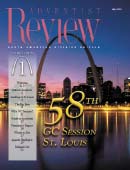 |
||
The biblical model is about the state of our hearts. It is about what motivates us, and it is about our relationship with God. Gradually the message that stewardship begins at the cross and not in our pockets has been accepted, and it has changed the lives of many individuals. In a society in which performance is the way to success, the example of the two mites of the widow reminds us that it is not the amount of the offering that counts; it is the state of the heart. Another important factor has been added to the teaching of biblically congruent stewardship principles and has met with strong support in every division. It is the interchangeableness of the two terms stewardship and discipleship. This concept was explained and accepted as the natural spiritual route a believer should follow to become a disciple. It is only in a daily walk with Christ that we can be good stewards and true disciples. Thus the choice of our motto for the department: "Growing stewards, making disciples." What happened during the past five years 2. A world stewardship summit was held in 2001. The new approach
was confirmed and accepted by world church leadership: 3. Two writers' workshops were held: one for division directors and others to better their understanding of the new approach, and help them develop materials and seminars contextualized to their own situation. The second workshop was for Sabbath school leaders/editors and contract writers to help them learn the concept of biblical stewardship and prepare new Sabbath school lessons to include biblical stewardship principles.
7. We redesigned and continued publication of the 16-page quarterly thematic stewardship resource journal, Dynamic Steward, edited by Claire Eva, which offers stewardship concepts, sermons, book reviews, youth and adult resources, and stewardship news. 8. We created a Web site to be the electronic library of the department. Its aim is to share resource materials, teach concepts, and communicate effectively. 9. We published: 10. The department continued to provide tithe and offering readings to all divisions and unions, to be reproduced and used in the local churches. 11. We developed various seminars and PowerPoint presentations on topics such as Church Budgeting and Time Management. Future Goals and Objectives 2. Provide a kit for a three-year stewardship plan at the local church level to be used by pastors or lay leaders. It will include a three-year plan, sermon outlines, and weekly materials and resources, so leaders may include elements of biblical stewardship in their worship and church life. 3. Identify stewardship trends that affect our church and its members. 4. Continue to implement "self-reliance" through training
and 5. Focus on training qualified and equipped stewardship leaders for divisions, unions, and conferences. Refine, expand, and continue to implement the stewardship certification process and curriculum to train division and union stewardship personnel as leaders and trainers. This will include stewardship institutes, designed to take selected personnel through to the second level of certification in a 90-hour training program over a period of 17 days. 6. Begin a series of stewardship education booklets, for use by both administrators and church members, on subjects such as capital funding, tithe, offerings, biblical stewardship, time management, etc. 7. Conduct stewardship consultations for selected conferences to help develop a customized local stewardship strategy. 8. Develop and provide various methods to help pastors determine local church faithfulness levels, encouraging appropriate reporting of critical data through the different organizational levels. Issues of Concern 2. Growing secularization--lack of integration of God into daily life. 3. Lack of balance between cognitive and relational truth. This includes the need to focus on building disciples, not mere converts. 4. Performance-based life and ministry focus that often has little room for intimacy with God and discipleship maturation. 5. Diminishing impact of leader-ship role, and the scarcity of qualified leaders in the area of stewardship. 6. Contemporary giving and stewardship trends that reflect a secularization of society and church. 7. Development of psychological and sociological maturations without accompanying spiritual maturity. 8. Recruiting and training pastors with biblical stewardship concepts and strategies. 9. Working with administrative leadership to implement a biblical stewardship approach to church finances. 10. Frequent turnover of stewardship department directors from division to conference levels. Convinced that our mission is to make disciples, the GC Stewardship
Department is committed to continuing to train pastors and church members to
grow spiritually and be ready to be given the final reward: "Well done,
good and faithful servant; you have been faithful over a few things, I will
make you ruler over many things" (Matt. 25:23, NKJV). |
 |
 |



 4. We created a three-level certification program:
4. We created a three-level certification program: